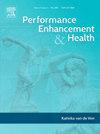Disordered Eating and Mental Health Across Lean and Non-Lean Sports: A Cross-Sectional Study of UK University Sports Club Members
IF 3.7
Q2 HOSPITALITY, LEISURE, SPORT & TOURISM
引用次数: 0
Abstract
Purpose
Higher education institutions (HEIs) are increasingly turning to preventative measures to improve student mental health outcomes. However, previous research has identified sports participation (especially lean sports) as a risk factor for eating disorders. Therefore, the purpose of this cross-sectional observational study was to investigate the association between sports club membership, disordered eating cognitions and vulnerability to mental health problems in a population of university students at UK HEIs.
Methods
Participants were UK students (77% female, average age = 21.66) who reported being a member of a university sports club (n=295) or not (n=242). Sports club members were further divided into lean (n=103) v non-lean sports (n=185). Participants completed an online survey including the Eating Attitudes Test (EAT-26), Strengths and Difficulties Questionnaire (SDQ), Figure Rating Scale (FRS) and Body Appreciation Scale-2 (BAS-2).
Results
In sports club members, EAT-26 and the emotional problems subscale of the SDQ were significantly lower than non-sports club members. Sports club members also had significantly lower body dissatisfaction and higher body appreciation than non-sports club members. The lean-sports group had the lowest EAT-26 scores and the lowest levels of body dissatisfaction and highest levels of body appreciation.
Conclusions
Overall, the results indicate that university sports club membership is associated with better mental health outcomes. Contrary to previous studies, lean sports participation was associated with the lowest levels of eating disorder attitudes.
在精益和非精益运动中饮食失调和心理健康:对英国大学体育俱乐部成员的横断面研究
目的高等教育机构(HEIs)越来越多地转向预防措施,以改善学生的心理健康结果。然而,之前的研究已经确定参加体育运动(尤其是瘦运动)是饮食失调的一个风险因素。因此,本横断面观察性研究的目的是调查体育俱乐部会员、饮食失调认知和心理健康问题易感性之间的关系。方法研究对象为英国学生(77%为女性,平均年龄21.66岁),均为大学体育俱乐部的会员(n=295)或非会员(n=242)。体育俱乐部成员进一步分为精益运动(n=103)和非精益运动(n=185)。参与者完成了一项在线调查,包括饮食态度测试(EAT-26)、优势和困难问卷(SDQ)、身材评定量表(FRS)和身体欣赏量表-2 (BAS-2)。结果体育俱乐部成员的EAT-26和SDQ的情绪问题分量表显著低于非体育俱乐部成员。体育俱乐部成员对身体的不满意程度显著低于非体育俱乐部成员,对身体的欣赏程度显著高于非体育俱乐部成员。瘦运动组的EAT-26得分最低,对身体的不满程度最低,对身体的欣赏程度最高。结论总体而言,大学体育俱乐部会员与较好的心理健康状况相关。与之前的研究相反,参加瘦身运动与饮食失调态度的最低水平有关。
本文章由计算机程序翻译,如有差异,请以英文原文为准。
求助全文
约1分钟内获得全文
求助全文
来源期刊

Performance enhancement and health
Social Sciences-Health (social science)
CiteScore
4.70
自引率
0.00%
发文量
27
审稿时长
57 days
 求助内容:
求助内容: 应助结果提醒方式:
应助结果提醒方式:


